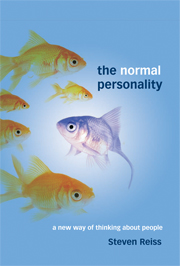Book contents
- Frontmatter
- Contents
- Acknowledgments
- Overview
- 1 My Wife Thinks Something Is Wrong with Me
- 2 The Sixteen Basic Desires
- 3 Intensity of Basic Motivation
- 4 Normal Personality Types
- 5 Overcoming Personal Troubles
- 6 Six Reasons for Adolescent Underachievement
- 7 Self-Hugging and Personal Blind Spots
- 8 Relationships
- 9 Reinterpretation of Myers-Briggs Personality Types
- 10 The Sixteen Principles of Motivation
- APPENDIX A Dictionary of Normal Personality Traits
- APPENDIX B Reiss Motivation Profile Estimator
- APPENDIX C The Sixteen Basic Desires at a Glance
- Notes
- References
- Index
2 - The Sixteen Basic Desires
Published online by Cambridge University Press: 05 June 2012
- Frontmatter
- Contents
- Acknowledgments
- Overview
- 1 My Wife Thinks Something Is Wrong with Me
- 2 The Sixteen Basic Desires
- 3 Intensity of Basic Motivation
- 4 Normal Personality Types
- 5 Overcoming Personal Troubles
- 6 Six Reasons for Adolescent Underachievement
- 7 Self-Hugging and Personal Blind Spots
- 8 Relationships
- 9 Reinterpretation of Myers-Briggs Personality Types
- 10 The Sixteen Principles of Motivation
- APPENDIX A Dictionary of Normal Personality Traits
- APPENDIX B Reiss Motivation Profile Estimator
- APPENDIX C The Sixteen Basic Desires at a Glance
- Notes
- References
- Index
Summary
Sixteen psychological needs (herein called basic desires) drive the human psyche and potentially explain a wide range of human experiences, everything from relationships to values (Reiss, 2000a). Based on peer-reviewed studies with thousands of people from different backgrounds (Havercamp & Reiss, 2003; Reiss & Havercamp, 1998), I believe that everybody embraces all sixteen basic desires, but they prioritize them differently. How an individual prioritizes these basic desires, called a Reiss Motivation Profile (RMP), reveals his or her values. Since many “normal” personality traits are habits people develop to satisfy their strong-and weak-intensity basic desires, the RMP is a valid indicator of normal personality traits and types. The RMP is a detailed description of human motivation, showing specific connections among motives, values, and many normal personality traits. If I know how an individual prioritizes and combines the sixteen basic desires, I can predict with significant validity the individual's behavior in real-life situations.
Nature of Basic Desires
We know what motives are – wants, desires, strivings, and psychological needs. The construct of a basic desire, however, refers to a particular kind of motive. Here are the five defining qualities of a basic desire.
UNIVERSAL MOTIVATION. Basic desires motivate everyone. As William McDougall (2003/1908) observed in his landmark book, An Introduction to Social Psychology,
Every man is so constituted to seek, to strive for, and to desire certain goals which are common to the species, and the attainment of which goals satisfies and allays the urge or craving or desire that moves us. […]
- Type
- Chapter
- Information
- The Normal PersonalityA New Way of Thinking about People, pp. 20 - 36Publisher: Cambridge University PressPrint publication year: 2008



